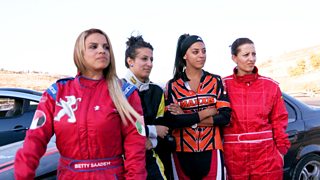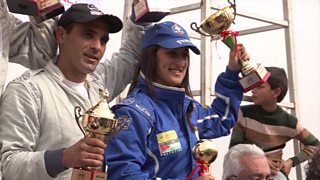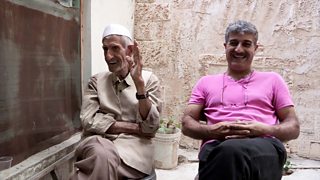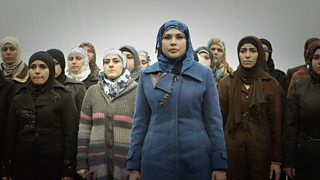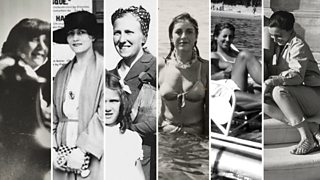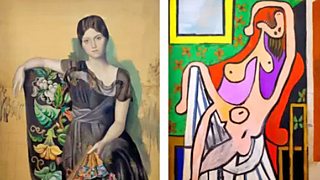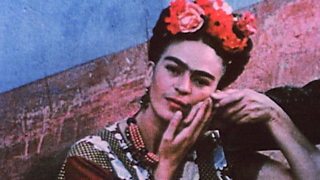Speed Sisters: Palestine's female racers in the driving seat
21 March 2016
Ahead of the cinema release of Speed Sisters, a new documentary about a team of ground-breaking female Palestinian racing drivers, BIDISHA explores how this unlikely tale explodes common assumptions about the role of women in the Middle East and also casts a light on life under military occupation in one of the world's most infamous conflict zones.
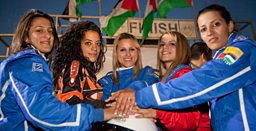
A rapper blasts out a rhyme in Arabic, drivers tear around a racecourse and spectators cheer wildly.
The exhilarating world of motor racing is the setting for Lebanese-Canadian director Amber Fares’s latest documentary – with a couple of twists.
The star racers are four Palestinian women – Marah, Betty, Noor and Mona
First, it’s set in the occupied territory of . Second, the star racers are four Palestinian women – Marah, Betty, Noor and Mona – led by team captain Maysoon.
celebrates the sport, reveals the oppressive reality of military occupation and dissolves stereotypes about Arab families’ expectations, Arab men’s sexism and Arab women’s assertiveness.
All the women enjoy the support of their families and the film gives parents and grandparents the opportunity to show their love, humour and (sometimes bemused) acceptance.
Of the team members, Noor has rock-star charisma, but her intensity makes her prone to making simple errors on the track.
We see her in her beautiful house, describing herself as “the happiest girl in the world” when she’s driving a 600-horsepower vehicle. A sticker on her car says, “Born to Race.”
Mona is apparently the most introverted member, but says she drives “for the release”.
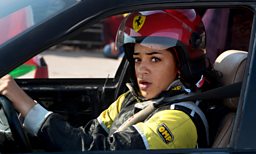
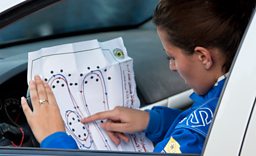
Watch clips from Speed Sisters
Betty is a vision of caricatured femininity, working her media image to gain sponsors.
The problem is that men are afraid of a strong woman. They worry she will take over
Filmed getting a manicure, she states: “It’s very important for me to show that I’m not a tomboy.” Yet her racing ambition is “to be the best”.
Marah’s mother believes that racing “opened [Marah’s] horizons.”
Having been expelled from the Israeli city of Haifa in 1948, the family are “still refugees” in Jenin in the West Bank.
Marah is desperate to experience new things, but without the right permits “I have to think of all the checkpoints and searches I’ll have to go through.”
Meanwhile, Maysoon endures comical battles with the one-man Racing Federation of Palestine.
She comments, “The problem is that men are afraid of a strong woman. They worry she will take over.”
Then there is the cruelty and instability of a military occupation.
Because of the checkpoints, arbitrarily closed roads and surveillance, there are no open spaces where practice is possible, so races and training sessions happen in a cleared vegetable market or a car park.
Trigger-happy, armed and armoured soldiers are everywhere and in one scene an individual is deliberately shot with a teargas canister.
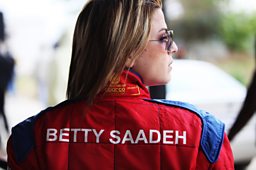
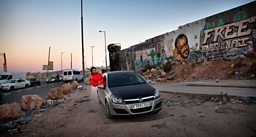
We see soldiers watching schoolchildren through the sights of their rifles and a checkpoint with people queuing silently as a soldier screams, “ID! ID! Where’s your ID?”
Racing means freedom. To do something you like to do, even if you’re under occupation
The team’s success does not always offer a way out.
To date, Mona, Betty and Marah are stuck in the West Bank and haven’t raced since last autumn, unlike Noor who is an international drift racer based in Dubai and Maysoon who is racing in Jordan.
I call Noor when she’s cruising down a Dubai street in her beloved car.
Like all the women, she stresses her skills and positivity over political commentary: “We’re not only under occupation, we’re also talented women showing what we can do. Some people think we’re like the women in Saudi Arabia, very strict, but we are open-minded, we like to go out, to see life, to have fun.
“Now I’m travelling a lot, I’m the only female drift racer, I am competing with men but I see so many girls in the crowd and they’re like, ‘I wanna be like you’.”
From Jordan, team captain Maysoon enthuses about her new life: “We are racing in real rallies in the desert.”
To her, “racing means freedom. To do something you like to do, even if you’re under occupation.”
Her ambitions for the team are to go global, gain sponsors and find the money to maintain the vehicles: “We’re the first all-women racing team, not just in Palestine, but in the Middle East. We made ourselves strong from nothing.”

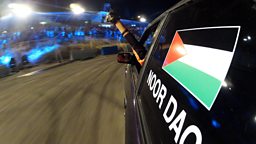
Although all the women show how proud they are to be Palestinian and how supportive they are of each other, they also think about what their success means for women in general.
We’re the first all-women racing team, not just in Palestine, but in the Middle East
Maysoon tells me, “There’s too many girls and women who have a dream to do what they want.
“I tell them, don’t let the men put you in the house just for housework and cooking and to stand behind your husband to put him up by putting yourself down.
“Fight for what you want, for your freedom, for your dream.”
I catch up with director Amber Fares by phone as she tours Speed Sisters at festivals worldwide.
For her, the film is a personal story. She says: “After 9/11 there was a lot of pushback against Muslim and Arab communities. What we were seeing in the media was so different from the people I knew. I thought it was important to show more dimensions.”
The idea came during her seven years living and working in the West Bank, when was invited to a race in Bethlehem.
She says: “I wondered how people could be racing, given the restrictions on movement. It took place on the top of a hill, on Yasser Arafat’s old helicopter landing pad.
“That’s what’s so great about these girls. Despite these conditions, which can weigh on you, psychologically they can rise above it and live life on their own terms. And that is a powerful, universal image.”
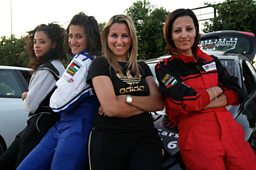
The Middle East on �鶹�� Arts
Speed Sisters, directed by Amber Fares, is released on 29 April 2016.
More from �鶹�� Arts
-
![]()
Picasso’s ex-factor
Who are the six women who shaped his life and work?
-
![]()
Quiz: Picasso or pixel?
Can you separate the AI fakes from genuine paintings by Pablo Picasso?
-
![]()
Frida: Fiery, fierce and passionate
The extraordinary life of Mexican artist Frida Kahlo, in her own words
-
![]()
Proms 2023: The best bits
From Yuja Wang to Northern Soul, handpicked stand-out moments from this year's Proms
